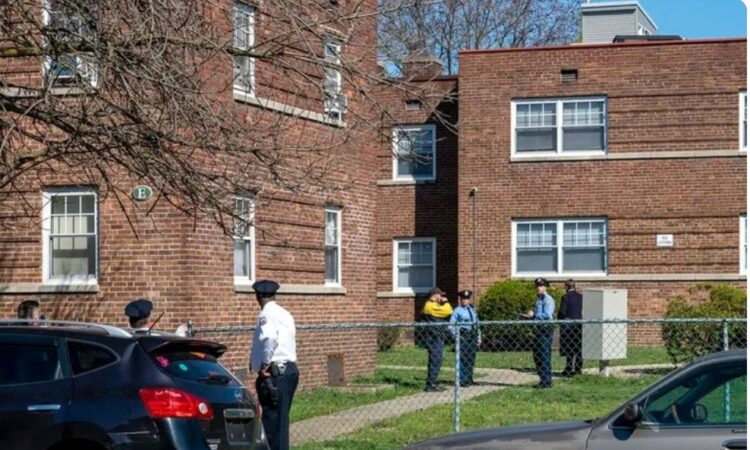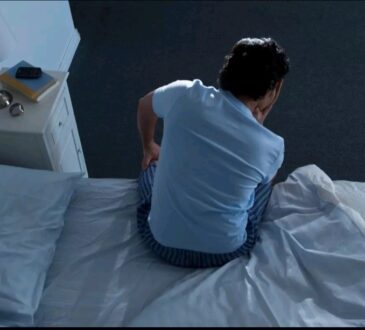
A Philadelphia deputy landlord-tenant officer shot a woman in the head while trying to enforce an eviction Wednesday morning, drawing a rebuke from housing advocates and raising alarm over the court system’s use of a deputized security force to eject renters.
The incident took place inside the Girard Court Apartments in Sharswood shortly after 9 a.m. Lt. Jason Hendershot, of the Police Department’s officer-involved-shooting unit, said the woman was at home with her husband in their first-floor apartment when the landlord-tenant deputy arrived in plain clothes to serve a court-ordered eviction.
A struggle ensued in the hallway, allegedly involving a knife, he said. The deputy discharged a weapon and struck the 35-year-old woman, who was taken to Penn Presbyterian Medical Center in critical condition. It was not immediately clear if the woman, whose name has not been released by authorities, was holding the knife.
Hendershot said the deputy appeared to have a head injury, though it was unclear if he required medical treatment.
Court records show the landlord alleged more than $8,000 in unpaid rent, but ultimately reached an agreement with the tenants last May that no money was owed, the tenants would move out by January, and the landlord would make necessary repairs. The tenants sought to postpone their eviction in October, alleging the landlord had failed to fix the property as promised. A judge denied their petition last month.
Officials have not released the name of the deputy landlord-tenant officer and details on the timeline leading up to the shooting remained hazy.
Despite their name, deputy landlord-tenant officers are not sworn law enforcement personnel.
Unlike other jurisdictions, Philadelphia courts rely on a private attorney, appointed by Municipal Court’s president judge and known as a landlord-tenant officer, to execute evictions. This attorney deputizes private security contractors to perform on-site lockouts in exchange for the right to collect millions in related eviction fees.
The shooting marks the first in recent memory involving one of these deputies but raises questions about oversight and training of a for-profit agent acting on behalf of the court system to serve writs and lockout orders brought against tenants.
A spokesperson for the First Judicial District referred questions to attorney Maria Shuter, the private attorney currently acting as the court’s landlord-tenant officer.
Neither Shuter nor her attorney returned phone calls.
Hendershot said police were investigating the incident like any shooting involving law enforcement officers. The writ server did not provide a statement to the police.
[He has] the right to remain silent, just like all of us do,” Hendershot said.
The shooting rattled a typically quiet apartment complex, tucked behind the bucolic Girard College campus. Neighbors said they heard a burst of gunshots before police officers swept through the redbrick complex, telling residents to stay indoors..
Jennifer Rivera said her heart broke when she saw her neighbor being carried out of the building — conscious and holding a piece of cloth to her head. Rivera knew the victim casually from chatting in the hallway.
”She’s a sweetheart,” Rivera said. ”She didn’t deserve that. No one does.”
Evictions are not uncommon at Girard Court.
Court records show building owners initiated at least three eviction claims against tenants this year, after at least 20 cases last year. The listed attorney for Girard Court could not immediately be reached for comment.
Citywide, tenants have accumulated significant housing debts since the pandemic, in many cases owing $5,000 to $10,000 in back rent. A new city mediation program has helped broker thousands of deals between tenants and landlords to avoid evictions.
Community Legal Services, a legal aid group that represents low-income tenants, said the confluence of dire housing situations and privately run court officers was bound to become volatile.
“The majority of Philadelphians facing eviction are Black and Brown people, who are frequently viewed as threats in their own home, when private citizens operating as officers show up with little to no notice to evict them,” Community Legal Services said in a statement.
The nonprofit also critiqued the courts for employing a private, for-profit attorney to serve evictions, calling it “a ‘pay to play’ system where poorly trained landlord-tenant officers are financially incentivized to perform evictions.”.
Even in law enforcement circles, these court-deputized agents are often confused for sheriff’s deputies — the sworn law enforcement officers that other jurisdictions deploy for eviction matters. Advocates said the distinction is even less clear for tenants.
Shuter had worked for the court’s prior landlord-tenant officer, and was appointed as a successor in 2017 through a noncompetitive and nonpublic process. She is the wife of Municipal Court Judge David Shuter and the daughter of former President Judge Alan K. Silberstein.
Shuter’s law firm is private and the identities of her deputies are not public information, nor are the guidelines imposed on the hires.
She has said in the past that the roughly eight contracted deputies she employs are licensed to carry firearms, provide their own weapons, hold court-issued identity cards, and are trained in eviction law by her office. Most are retired police officers, constables, or private security guards, according to Shuter.
“The goal of the landlord-tenant officer is to do everything possible to maintain a peaceful, smooth, safe, and non-confrontational process,” she said in a 2020 WHYY profile.
Some critics have accused officers of intentionally trying to catch tenants off guard. It’s not clear if tenants knew a deputy was arriving Wednesday morning, as advocates said the Landlord-Tenant Office typically does not notify renters about the exact date a lockout will occur.
And the eviction business has nevertheless led to several confrontations over the decades.
Prior to Shuter’s appointment, in the 1980s, a tenant threatened to shoot himself during one encounter, and another deputy was shot and killed during an eviction in West Philly in the 1990s.




